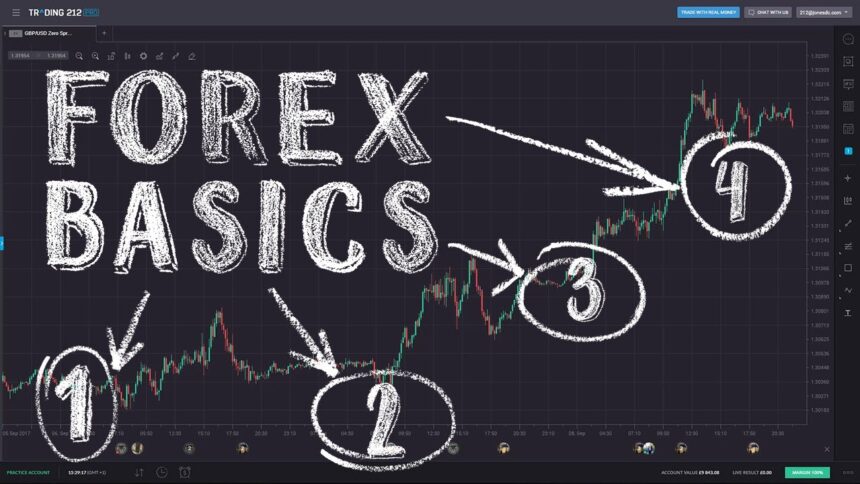Forex trading, also known as foreign exchange trading or currency trading, is the buying and selling of currencies with the aim of generating a profit. It involves trading one currency against another and speculating on the fluctuations in their exchange rates.
Forex trading is typically done through a broker or market maker, and can be conducted 24 hours a day, five days a week. It’s a popular form of trading due to its potential for high returns, but it also carries a high level of risk.
How to Trade Forex:
I can explain the basics of how to trade forex.
- Learn the basics: Before you start trading, you should learn about the forex market, including the different currencies, how they are traded, and the factors that influence their exchange rates. There are many online resources available, such as tutorials, webinars, and e-books that can help you get started.
- Choose a forex broker: You’ll need to choose a forex broker that provides you with a trading platform and access to the forex market. Look for a broker that is regulated and has a good reputation.
- Open a trading account: Once you’ve chosen a broker, you’ll need to open a trading account. You’ll need to provide some personal information and complete the necessary paperwork. You may also need to make a deposit to fund your account.
- Analyze the market: Before you make a trade, you’ll need to analyze the market to determine which currency pairs to trade and when to enter and exit the market. There are a variety of tools and strategies you can use for market analysis, including technical analysis and fundamental analysis.
- Place your trades: Once you’ve analyzed the market, you’ll need to place your trades through your trading platform. You’ll need to specify the currency pair, the trade size, and the direction of the trade (buy or sell).
- Monitor your trades: After you’ve placed your trades, you’ll need to monitor them to see how they are performing. You can do this through your trading platform, which will show you the current price of the currency pair and any profits or losses you’ve made.
- Manage your risk: Forex trading carries a high level of risk, so it’s important to manage your risk carefully. This may involve using stop-loss orders to limit your potential losses, or using leverage with caution.
Overall, forex trading requires a combination of knowledge, skill, and discipline. It’s important to be patient and to develop a trading strategy that works for you.
Is forex trading good for beginners?
Forex trading can be good for beginners, but it is important to approach it with caution and a willingness to learn. The foreign exchange market can be complex and volatile, so it is important for beginners to take the time to educate themselves on the basics of trading, risk management, and market analysis. One way to start is by using a demo trading account, which allows you to practice trading without risking any real money. As you gain experience and confidence, you can gradually move on to trading with real funds. It’s also important to keep in mind that forex trading involves risks, so it’s important to have a solid trading plan and to never trade more than you can afford to lose.
Best Forex Trading Platforms for Beginners
There are several forex trading platforms that are well-suited for beginners. Here are some of the most popular ones:
- MetaTrader 4 (MT4): This is one of the most widely used forex trading platforms in the world. It offers a user-friendly interface, a variety of charting tools, and the ability to use automated trading strategies.
- eToro: This platform is known for its social trading features, which allow you to copy the trades of more experienced traders. It also offers a demo account for beginners to practice trading without risking real money.
- FOREX.com: This platform is part of GAIN Capital Holdings, Inc., which is a publicly-traded company. It offers a range of educational resources for beginners, including webinars and a trading academy.
- Plus500: This platform offers a simple and intuitive interface, as well as a demo account for beginners. It also offers a range of trading instruments, including forex, stocks, and commodities.
- IQ Option: This platform is known for its low minimum deposit requirement and user-friendly interface. It also offers a range of educational resources for beginners, including video tutorials and a trading blog.
Before choosing a forex trading platform, it’s important to do your research and ensure that you understand the fees, features, and tools offered by each platform.
Is forex trading profitable?
Yes, forex trading can be profitable, but it requires a solid understanding of the market, effective trading strategies, and sound risk management practices. As with any investment, there are risks involved in forex trading, but with a well-planned approach, traders can potentially earn significant profits.
However, it’s important to note that not all traders make money, and losses can occur as well. Success in forex trading often depends on a trader’s ability to analyze market trends and make informed decisions based on that analysis. It’s also important to have realistic expectations and to never risk more than you can afford to lose.
Forex trading can be profitable in a number of ways, including:
- Pips: Pips are the smallest unit of measurement in forex trading, and they represent the change in value between two currencies. By buying a currency pair at a lower price and selling it at a higher price, you can earn a profit in pips.
- Leverage: Forex brokers often offer leverage, which allows traders to control larger positions with relatively small amounts of capital. This means that even small price movements can result in significant profits (or losses).
- Interest rate differentials: When trading currency pairs, traders can earn interest on the currency they hold (known as the “carry trade”). If the interest rate on the currency you hold is higher than the interest rate on the currency you are trading it against, you can earn a profit on the interest rate differential.
- Market analysis: By analyzing market trends and using technical and fundamental analysis, traders can make informed decisions about when to buy and sell currency pairs. This can help them to take advantage of profitable trading opportunities.
Overall, successful forex trading requires a combination of market knowledge, effective risk management, and sound trading strategies.
Forex Trading Courses
There are many forex trading courses available online, and some of them include:
Forex Trading A-Z – With Live Examples by Udemy: This course covers the basics of forex trading, including technical analysis, risk management, and trading psychology. It also includes live trading examples to help students apply what they have learned.
The Complete Foundation FOREX Trading Course by Udemy: This course covers the fundamentals of forex trading, including how to read currency charts, how to use technical indicators, and how to develop effective trading strategies.
Forex Trading for Beginners (3-course bundle) by Stock Market College: This comprehensive course bundle includes three courses on forex trading for beginners, covering everything from the basics of forex trading to advanced trading strategies.
The Advanced Forex Course for Smart Traders by Forex Mentor: This course is designed for experienced traders who want to take their trading to the next level. It covers advanced trading strategies, risk management techniques, and market analysis.
Forex Trading Strategies by Platinum Trading Academy: This course covers a range of trading strategies, including scalping, swing trading, and position trading. It also includes live trading sessions and personalized coaching.
These are just a few examples of the many forex trading courses available online. It’s important to research each course carefully to find the one that best meets your needs and fits your trading style.






